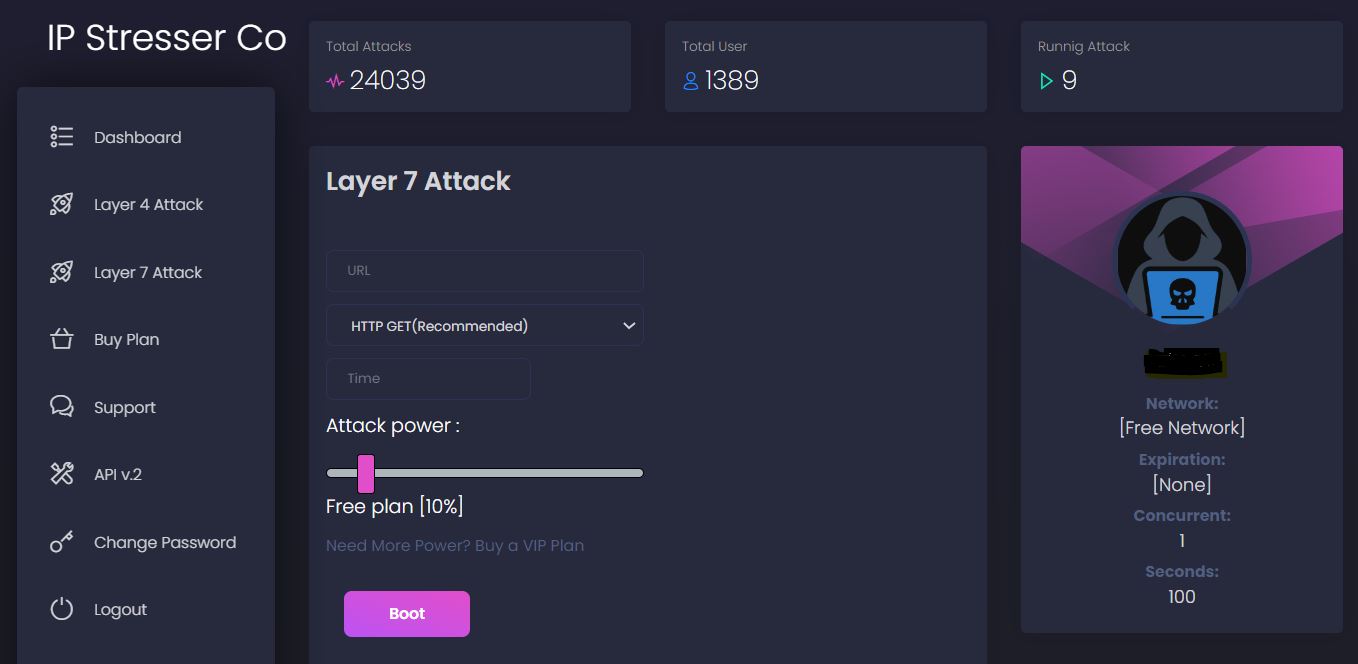What is an IP Stresser?
An IP stresser is a type of Webservice that is used to send large amounts of traffic to a particular IP address or website. This can be done for a variety of reasons, such as testing the website's capacity to handle large amounts of traffic, or as a form of denial-of-service attack. IP stressers are often used by hackers to launch attacks on websites, but they can also be used by legitimate businesses and organizations to test their websites' performance.
A Denial of Service (DoS) attack is designed to prevent a legitimate user from accessing a resource, such as a website or a network. Distributed Denial of Service (DDoS), on the other hand, is a variant of the DoS attack where multiple compromised machines work together to target a single victim. This attack floods the computer network with an overwhelming amount of data packets.
What exactly is an IP stresser ?
An IP stresser is a type of Webservice that is used to send large amounts of traffic to a particular IP address or website. This can be done for a variety of reasons, such as testing the website's capacity to handle large amounts of traffic, or as a form of denial-of-service attack. IP stressers are often used by hackers to launch attacks on websites, but they can also be used by legitimate businesses and organizations to test their websites' performance.
An IP stresser, also known as an IP booter or a network stresser, is a tool used to test the resilience and stability of a network or server by simulating high volumes of traffic. It works by overwhelming the target's network infrastructure with an excessive amount of data packets, causing it to become overloaded and potentially crash.
IP stressers are often utilized for legitimate purposes such as testing the capacity and security of networks, identifying vulnerabilities, or conducting stress tests. However, they can also be misused for malicious activities such as launching DDoS (Distributed Denial of Service) attacks on websites or online services.
It is important to note that using an IP stresser for illegal activities is against the law in most jurisdictions. Engaging in such activities can result in severe legal consequences. Therefore, it is crucial to exercise responsible and ethical behavior when utilizing any tools related to network testing or security assessments.
IP stressers focus on a particular IP address by employing a network of devices known as botnets. These botnets generate an excessive amount of traffic, overwhelming the system resources of the targeted IP address. Consequently, this can result in potential downtime, server errors, and unavailability problems. The majority of IP stressers utilize various attack methods such as TCP, UDP, and ICMP protocols to target the machines. The success of IP stressing relies on factors such as the bandwidth at hand, the duration of the attack, and the capability to bypass the DDoS protection services and firewalls of the host server.
What are the purposes of using a IP Stresser?
The purpose of an IP stressor can vary depending on the situation. There are several different uses and purposes for these tools.
One common purpose is testing. Companies and large organizations often use IP stressors to test the stability of their systems, manage their devices, and detect any malicious or unusual activities. These tools can also help identify any gaps or areas for improvement in the system.
Another purpose is hacking. IP stressors are often used to overload web servers, causing them to become paralyzed and unable to process legitimate requests. This can result in downtime for the targeted website or service.
IP stressors can also be used for simulation purposes. Many organizations use these tools to simulate peak traffic loads in order to monitor and improve the performance of their websites under such challenging conditions.
It is important to consider the ethical implications and legality of using IP Stresser. In general, using these tools for testing purposes is considered normal and legal, as long as you are the owner of the website or have permission from the owner to perform the tests. However, using IP stressors to perform DDoS attacks on websites that do not belong to you is illegal in most countries.
Important points in choosing a IP stresser
When selecting the appropriate IP stresser, there are several crucial factors to take into account:
- Layers: It is advisable to opt for IP stressors that are compatible with both layer 4 and 7 attacks, as they provide greater flexibility and options.
- Attack duration: It is important to choose services that offer a substantial attack time, ensuring that you can conduct tests over a sufficiently long period to gather accurate results.
- Bandwidth: Look for services that provide high bandwidth capabilities, as this will enable you to effectively target and disrupt high-end server areas.
- Pricing: It is recommended to seek out reasonably priced services that offer a favorable price-performance ratio for your specific application case.
What drives individuals to carry out denial-of-service attacks?
The reasons behind denial-of-service attacks vary, including individuals seeking to improve their hacking abilities, competition between businesses, conflicting ideologies, state-sponsored terrorism, or demands for money. Extortion attacks typically involve payment through PayPal or credit cards, while Bitcoin is also utilized due to its potential to conceal identities. However, a drawback for attackers is the limited usage of bitcoins compared to other payment methods.
